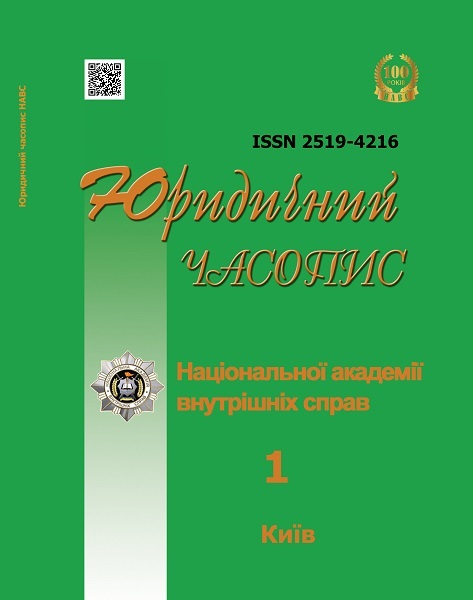Ethical Foundations of Service Law
Abstract
The purpose of the article is to evaluate the scientific positions on the impact of ethics on law in general and the structural elements of the law system, in particular, to determine the directions and results of such influence, as well as to clarify the role of ethical foundations in the formation of an effective mechanism of legal regulation of public service. Methodology. Given the goal, specificity of the object and object of study, the methodological basis of the publication is a set of methods that allowed to consider approaches to understanding the role of ethics in law. Formal logic method ‒ to find out the content of employment law. The empirical method was applied in the study of the formation of ethical principles of employment law. Comparative ‒ to compare Ukrainian and foreign approaches to the formation of ethical principles of official law. Scientific novelty is due to the fact that the ethical component is the basis for the formation of the legal system at the axiological, epistemological, praxeological levels. Therefore, the publication substantiates the differences between the concepts of «ethics of law», «legal ethics», «legal ethics» and «legal ethics». Conclusions. An important element of improving the law of service is the ethical component. First, the reduction of the influence of the authorities and religious norms on human behavior, which requires the formation of a new or improvement of the old mechanism of regulation of social relations. Secondly, law and morality in the form of ethics are historically interrelated and the mechanism of their interplay is time-tested. Thirdly, they have an inherent compensatory function ‒ where the right to resolve a social conflict comes to the aid of moral standards, in turn ‒ a decrease in the level of morality due to the peculiarities of social development (diminishing human attention to society through digitization, the emergence of new values) is compensated for due to the consolidation of ethical rules in the rules of law.
Keywords: service law; ethics; ethical standards; ethical criteria; subjects of public law; public legal relations.
Downloads
References
Чернецький Є. Є. Характеристика заслуги як основної підстави адміністративно-правового заохочення. Держава і право. 2009. № 46. С. 261–267. doi: 10.32702/2307-2156-2009.3.100.
Держивицкий Е. В., Ларионов И. Ю., Перов В. Ю. К вопросу об этике права. Вестник Санкт-Петербургского государственного университета. 2016. Вып. 4. С. 33‒45.
Камінська Н. В. Організаційно-правові засади децентралізації публічної влади. Науковий вісник Національної академії внутрішніх справ. 2010. № 4. С. 9‒20.
Каминская Н. В. Перспективы становления европейской системы местного и регионального самоуправления. Право и политика. 2015. № 2 (182). С. 227‒241. doi: 10.7256/1811-9018.2015.2.8854.
Кузьменко О. В., Стрельченко О. Г. Детермінація заслуги як підстава заохочення. Держава і суспільство. 2008. № 5. С. 41–46. doi: 11.56702/2308-2356-2008.3.189.
Макушев П. В., Сибірякова М. В. Шляхи формування антикорупційної громадянської свідомості як чинник мережевого суспільства. Право і суспільство. 2010. № 3. С. 88‒96.
Загальні правила етичної поведінки державних службовців та посадових осіб місцевого самоврядування : наказ Національного агентства України з питань державної служби від 5 серп. 2016 р. № 158. URL: https://zakon.rada.gov.ua/laws/show/z1203-16.
Нестерович В. Ф. Категорія «інтерес» у правотворчості: загальнотеоретичні аспекти. Вісник Луганського державного університету внутрішніх справ. 2006. № 1. С. 73–78.
Нестерович В. Ф. Конституційно-правові засади лобіювання у Федеративній Республіці Німеччини. Вибори та демократія. 2009. № 3. С. 59‒66.
Нестерович В. Ф. Субсидійовані форми регулювання лобіювання: зарубіжний досвід та перспективи для України. Вісник Луганського державного університету внутрішніх справ імені Е. О. Дідоренка. 2011. № 4. С. 15‒24.
Нестерович В. Ф. Принципи відкритості та прозорості у діяльності органів державної влади як важлива передумова для утвердження демократії участі. Філософські та методологічні проблеми права. 2016. № 2 (12). С. 67‒76. URL: https://philosophy.naiau.kiev.ua/index.php/philosophy/article/view/364.
Нестерович В. Ф. Конституційно-правові види громадських обговорень. Вісник Луганського державного університету внутрішніх справ. 2018. № 4. С. 38‒45. doi: https://doi.org/10.33766/2524-0323.84.38-45.
Рудакевич М. Етика державних службовців : монографія. Київ : НАДУ, 2003. 360 с.
Рудакевич М. І. Ідейні основи та нормативні стандарти етики державних службовців країн Європейського Союзу. Державне управління: теорія та практика. 2006. № 1. C. 73–79.
Рудакевич М. І. Професійна етика державних службовців: теорія і практика формування в умовах демократизації державного управління : монографія. Тернопіль : Астон, 2007. 398 с.
Сливка С. С. Юридична деонтологія : навч. посіб. Київ : Атіка, 2008. 296 c.
Товмач А. С. Питання етики державних службовців. Форум права. 2015. № 2. С. 159–162.
Титко А. В. Фаворитизм, непотизм, кронізм, клієнтелізм як форми конфлікту інтересів: quid pro quo. Форум права. 2019. № 55 (2). С. 80–90. doi: http://doi.org/10.5281/zenodo.2635567.
Василевська Т. Е. Етичні аспекти реформування системи державної служби. Демократичне врядування. 2011. № 7. URL: http://www.lvivacademy.com/visnik7/fail/vasylevska.pdf.
Василевська Т. Е. Етика державних службовців і запобігання конфлікту інтересів : навч.-метод. матеріали. Київ : НАДУ, 2013. 76 с.
Abstract views: 4212 PDF Downloads: 263
Copyright (c) 2020 Law Magazine of the National Academy of Internal Affairs

This work is licensed under a Creative Commons Attribution-NonCommercial-NoDerivatives 4.0 International License.
- Authors reserve the right to authorship of their own work and transfer to the magazine the right of the first publication of this work under the terms of the Creative Commons Attribution License, which allows other persons to freely distribute published work with mandatory reference to authors of the original work and the first publication of an article in this magazine.
- Authors have the right to enter into separate additional agreements on non-exclusive dissemination of the work in the form in which it was published in the journal (for example, to post an article in the institution's repository or to publish as part of a monograph), provided that the link to the first publication of the work in this journal is maintained.
- The journal's policy allows and encourages the posting of articles by authors on the Internet (for example, in electronic storehouses of institutions or on personal websites), both before the submission of this manuscript to the editorial office and during its editorial processing, as this contributes to the creation of a productive scientific discussion and positively affects the efficiency and dynamics of citing the published work.




